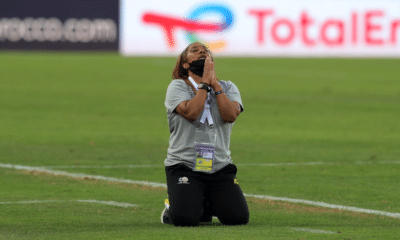
The one major distinctive of the remaining World Cup participants has been Morocco’s defence. Not Messi’s excellence, Modric’s elegance or Mbappe’s fleetness. The Atlas Lions have conceded just one goal in the entire tournament (and even that was an own goal). Walid Regragui has put together a team that is very difficult to break down. Ask Kevin de Bruyne. Ask Luka Modric. Ask Alphonso Davies. Ask Sergio Busquets. Ask Bruno Fernandes. Even when the defence had to be reshuffled to cater for injuries, the replacement parts have been just as good. Whichever way you present them, the overall numbers look good:
0 – goals scored against Morocco by an opposition player, the best defensive record of all teams
1 – goals conceded by Morocco in Qatar (an own-goal), the fewest of all sides at the tournament
2 – the World Cup record for fewest goals conceded by a team reaching the final (France 98, Italy 2006 and Spain 2010)
4 – clean sheets by Morocco at this World Cup, more than any other side
4 – clean sheets by Morocco at this World Cup, more than they managed in 5 prior World Cups
3 – clean sheets by Yassine Bounou, the first African goalkeeper to record more than two clean sheets in a single edition of the World Cup
Some of the underlying numbers also back up the assertion that something special is happening.
0.89 – xGA per 90 (expected goals against per 90 minutes) for Morocco, only 5 teams at the World Cup have a better xGA record
0.89 – xGA per 90 for Morocco, only Argentina have a better xGA record of the remaining teams
8.4 – shots per 90 taken against Morocco, bettered only by Argentina & Brazil among teams to reach the quarter-finals
1.5 – shots on target per 90 against Morocco, only Argentina (1.13) & Ecuador (1.0) have allowed fewer shots on target
Even Portugal, who scored six past Switzerland in the previous round struggled and only managed 0.9xG against Morocco. The shot map below shows how none of the Portuguese chances were very threatening (all small circles). Plus they only had one shot (a late Pepe header) inside the six-yard box.
The numbers are one thing, but the how is also just as enthralling. When chasing a goal, the Atlas Lions actually resemble their nickname in a sense. They hunt aggressively and in packs on either wing, full of intense high pressing in twos and threes. But once they take the lead, Morocco have perfected their block, and are content with as little possession as possible. In the match against Portugal, not much was created after their goal. The threat map below shows how the majority of the threat was all Portugal’s in the second half.
27% – Morocco’s possession against Portugal (their 2nd lowest at the tournament, 24% v Spain)
32% – average Morocco possession at the World Cup (only Costa Rica, 31% averaged less)
Importantly, the low amount of possession is not passive. Instead, it is paired with an aggressiveness that few sides have been able to handle out in Qatar. No team has attempted and completed more tackles at the tournament, with players like Hakimi, Amrabat and Mazraoui leading in these numbers.
104 – tackles attempted by Morocco in Qatar, more than any team
63 – tackles won by Morocco in Qatar, more than any team
144 – clearances by Morocco in Qatar, more than any team
66 – blocks by Morocco in Qatar, more than any team
19 – tackles attempted by Hakimi in Qatar, more than any player
13 – tackles won by Hakimi in Qatar, more than any player except Jude Bellingham
12 – tackles attempted in the defensive third by Hakimi and Amrabat in Qatar, more than any player
Kylian Mbappe & co. will have to break this defence apart if they want to get to a second successive final. They are likely to see more of the ball on the day, but that possession will invite pressing and tackles they may not be able to deal with.
























